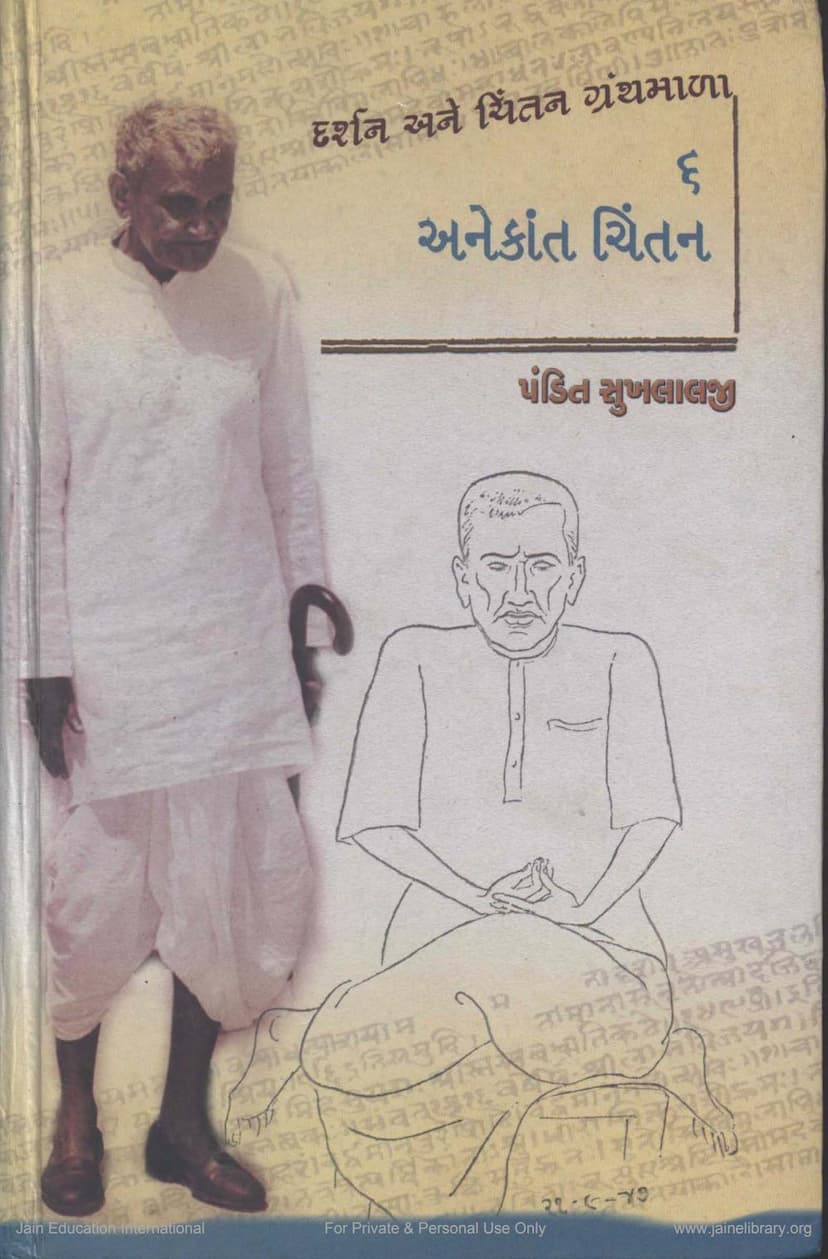Anekanta Chintan
Added to library: September 1, 2025

Summary
Anekanta Chintan by Pandit Sukhlal Sanghavi: A Comprehensive Summary
"Anekanta Chintan" (Thought on Plurality) is a seminal work by the esteemed Jain scholar Pandit Sukhlal Sanghavi, published by Gurjar Granthratna Karyalay. This book is a collection of essays that delves into the philosophical and intellectual contributions of Pandit Sukhlalji, particularly focusing on his profound understanding and articulation of Jain philosophy, with a special emphasis on the concept of Anekantavada (non-one-sidedness or manifold aspect).
The book is part of the "Darshan ane Chintan Granthamala" (Series of Philosophy and Thought), signifying its serious academic and philosophical intent.
Key Themes and Contributions of Pandit Sukhlal Sanghavi as highlighted in the book:
- Anekantavada as the Core of Jain Philosophy: The book champions Anekantavada as the central tenet of Jainism. Pandit Sukhlalji argues that truth is multifaceted and can only be approached by considering all possible perspectives. He emphasizes that Anekantavada is not about endless debate but about fostering an open-minded approach to all ideas to arrive at truth.
- Critique of Dogmatism and Narrow Perspectives: Pandit Sukhlalji’s writings, as presented in this book, consistently advocate for a broad and inclusive approach to philosophical inquiry. He criticizes dogmatism, rigid adherence to single viewpoints, and the tendency for sectarianism to narrow down spiritual and intellectual exploration. He highlights the historical instances where spiritual traditions became exclusive and prone to mutual refutation, losing sight of the broader goal of self-purification and understanding.
- Methodology of Philosophical Inquiry: A significant aspect of Pandit Sukhlalji's approach, reflected in the book, is his emphasis on historical and comparative analysis. He delves deep into the core of any philosophical principle, tracing its historical evolution, identifying subsequent refinements, potential distortions, and its position relative to other philosophical systems. This allows for a comprehensive understanding of how different philosophical ideas have influenced each other.
- Emphasis on Intellectual Rigor and Honesty: His writings are characterized by deep contemplation, keen observation, and a genuine commitment to truth-seeking. The book showcases his intellectual honesty, where he readily acknowledges the acceptance of new facts and the willingness to change his views if new evidence emerges. There is no trace of intellectual arrogance or ego in his profound explorations.
- Interconnectedness of Philosophy and Conduct: Pandit Sukhlalji's sadhana (spiritual practice) was not limited to mere intellectual pursuit. It extended to all spheres of conduct and thought. His writings, though penned years ago, remain relevant today, offering insights akin to reading the Upanishadic pronouncements of an ancient sage.
- Contribution to Jain Logic (Jain Nyaya): The book highlights Pandit Sukhlalji's significant contribution to clarifying complex Jain philosophical concepts such as Anekantavada, Syadvada (the doctrine of conditional predication), Naya (standpoints), and Saptabhangi (the sevenfold syllogism). He is recognized as the first scholar to conduct a comparative study of texts like Siddhasena Divakara's complex "Dvatrimshat-dvatrimshika," thereby presenting these principles with greater clarity.
- Jain Philosophy and its Place in Indian Thought: The initial chapters of the book provide an insightful overview of Jain philosophy within the broader context of Indian philosophical traditions. It traces the origins of philosophical inquiry, the emergence of various darshanas (schools of thought), and the Jain perspective on reality (Satu) which uniquely emphasizes considering all possible facets to approach the true nature of reality.
- The Nature of Truth and Reality: The book explores the Jain understanding that truth is one, but human perception is limited. Therefore, to realize truth, one must expand their perspective and accommodate all possible ways of grasping it. This broad and noble sentiment is the genesis of the Anekantavadi thought process.
Structure and Content:
The book is structured into various essays, covering a wide range of philosophical topics, including:
- Jain Philosophy: Discussing the fundamental principles of Jain metaphysics and ontology.
- Development of Jain Logic: Tracing the historical evolution and key concepts of Jain logical reasoning.
- Saptabhangi: A detailed exploration of the Jain doctrine of manifold aspects and its implications.
- The Nature of Authority (Pramanya): Examining whether the source of knowledge is intrinsic or extrinsic.
- Indian Philosophies on Time: A comparative study of how different Indian schools of thought understood the concept of time.
- The Nature of Narrative and its Literary Exposition: Analyzing different literary and narrative techniques.
- Specific Jain Doctrinal Discussions: Including topics like "Nigoda Jati" (a class of fundamental souls) and identifying the author of the "Avashyak Sutra."
- Analysis of Key Jain Texts: Such as "Sanmatitarka" and "Hetubindu," highlighting their significance and content.
- Cultural Studies: Examining cultural insights from historical texts like "Harshacharita" and analyzing spiritual figures like Shrimad Rajchandra.
Overall Significance:
"Anekanta Chintan" is more than just a collection of essays; it is a testament to Pandit Sukhlal Sanghavi's deep scholarship, his ability to synthesize complex philosophical ideas, and his unwavering dedication to promoting a rational and inclusive understanding of Jain philosophy. The book serves as an invaluable resource for anyone seeking to understand the depth and breadth of Jain thought and its significant contributions to the global philosophical landscape. It reflects the publisher's commitment to preserving and disseminating the profound thoughts of Pandit Sukhlalji, ensuring his intellectual legacy continues to inspire and enlighten.